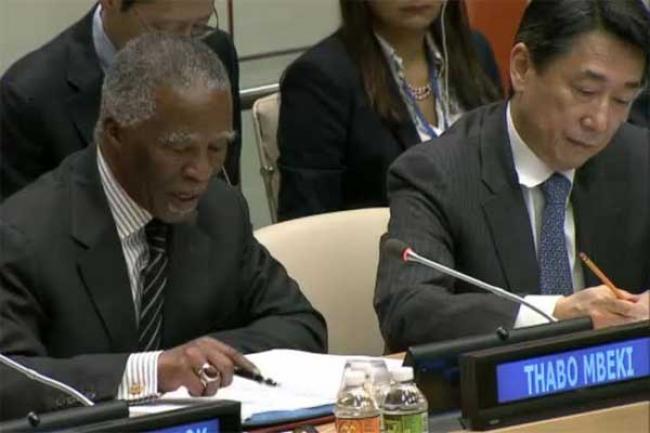Just Earth News/IBNS 20 Feb 2016, 04:31 pm Print

Photo: Video Capture. UNTV
In a special briefing to the Council, Mbeki, Chair of the UN Economic Commission of Africa (UNECA) High-Level Panel on Illicit Financial Flows from Africa, said the issue of illicit financial flow came up during the discourse on how to mobilize domestic resources in the context of the newly-adopted 2030 Sustainable Development Agenda.
The panel was established at the 4th meeting of the Joint African Union Commission – UN-ECA Conference of African Ministers of Finance, Planning and Economic Development in 2011. “There is now a universal consensus that illicit financial flow is a challenge requiring global action,” he said.
Issues related to illicit financial flows, such as taxation, corruption, the function of the corporate sector, and recovery of stolen assets have been identified, he said, urging ECOSOC to elaborate action plans and practical steps to be taken to address those challenges.
The Addis Ababa Action Agenda and the 2030 Agenda for Sustainable Development, adopted in 2015, provided a positive climate to address illicit financial flows, he said, adding that the indicators for measuring implementation of the development goals, including that for illicit financial flow, must be developed.
African countries are not simply asking others to rectify the situation, but are firmly committed to addressing the issue from within, he said. To do that, institutional capacity must be bolstered.
At an AU Summit last year, African leaders decided to prepare annual reports on implementation, he said, calling for the establishment of a coordinating mechanism between AU and ECOSOC.
ECOSOC President Oh Joon said that implementing the transformative agenda for sustainable development will present formidable challenges. These challenges will be no doubt steepest for Africa, he said.
“Stemming illicit financial flows from Africa is both an African and international challenge,” he said. “The call made by the High-Level Panel for engagement with partner institutions to elaborate a global governance framework to address this problem, therefore deserves our full attention.”
Other members of the High-level Panel also delivered presentations, followed by a question and answer session between Member States and Mbeki. Interventions were made by South Africa, Sweden, Italy, Zimbabwe, Uganda, Peru, Benin, Botswana, and Gambia.
- ISIS-inspired plot foiled in UK: Two men get life sentences for targeting Jewish community
- India rejects allegations, urges Pakistan to tackle its ‘home-grown ills’
- Massacre in Islamabad: ISIS takes responsibility for deadly Pakistan blast
- Friday turns fatal: 31 dead, 169 injured in shocking Pakistan mosque blast
- Explosion at packed mosque in Pakistan turns Friday prayers into scene of carnage, 15 dead





-1763561110.jpg)
